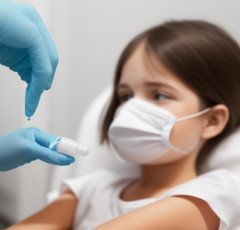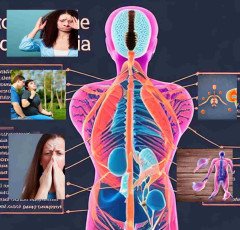The influenza vaccine, generally known as the flu shot, is crucial for various reasons.vaccinated against the flu protects not only you but also those around you.
Keeping Flu from Spreading
Flu is an infectious respiratory infection brought on by influenza viruses. The danger of contracting the flu and passing it on to others can be considerably decreased by getting vaccinated, especially for those who are more susceptible, such as the elderly, small children, pregnant women, and people with compromised immune systems.
Reducing Illness Severity, Even if you contract the flu after receiving the vaccine, the vaccine can still help shorten the length and severity of your illness. By doing this, major flu-related complications and hospitalizations can be avoided.Protecting Those at High Risk, People who have specific medical conditions (such as chronic lung disease, heart illness, or diabetes) are more likely to experience serious complications from the flu. They may receive an additional layer of protection from vaccination.
Avoiding Healthcare Overload, During flu seasons, influenza can lead to an increase in hospitalizations, which can strain healthcare infrastructure. By being immunized, you help ease the strain on medical resources.
Preventing Deaths From the Flu, The flu can cause serious complications and, in rare situations, can be fatal. Flu-related mortality can be avoided with the flu shot, especially in susceptible groups.
Reducing Absenteeism, Influenza can result in large absences from work or school, which has an effect on output and academic performance. The number of days missed due to the flu can be reduced with vaccination.
Influenza viruses constantly evolve, resulting in new strains of the virus spreading every year. The flu vaccine is updated every year to include the most recent strains, improving defense against the most recent viruses.
Building Herd Immunity
When a sizable section of the populace receives vaccinations, it contributes to the development of herd immunity, which reduces the likelihood of the virus spreading. This helps people who, owing to age or medical conditions, cannot get the immunization.
For the vast majority of people, the flu vaccination is safe. While some people may suffer minor side effects after the vaccine, including as discomfort at the injection site or mild flu-like symptoms, these are incredibly rare. For the majority of people, the advantages of immunization significantly outweigh the dangers, making the flu vaccine an essential component of public health initiatives to combat seasonal influenza.
Influenza is a global health concern because it may spread fast across borders and damage people everywhere. Vaccination initiatives aid in controlling the virus's spread, making them a crucial component of efforts to secure world health.
Fighting Misinformation
There have been a number of misunderstandings and misinformations about the flu vaccine. To promote universal immunization and safeguard the public's health, it's essential to communicate truthful information regarding the flu shot's effectiveness and safety.
The optimum time to get vaccinated against the flu is before the season begins, which is typically in the fall. By obtaining your vaccination in advance, you give your body enough time to develop protection before the height of flu season.
Traveler Protection
Getting vaccinated can offer an extra layer of defense against the flu strains that are common in your destination and lower your chance of getting sick while traveling, especially if you are planning to travel during flu season.
Increasing Immunity, Although the flu vaccine may not provide 100% protection for some age groups and people with compromised immune systems, it can nevertheless increase a person's immunity and lessen the severity of their sickness if they do get the flu.
Safe for Pregnant Women, Since they are more likely to experience serious flu-related problems, pregnant women must receive the vaccine. Pregnant women can receive the flu shot without risk, and it will protect both the mother and the fetus.
Supporting Healthcare Professionals, By receiving a flu shot, healthcare professionals defend both themselves and their patients against the illness. This procedure is especially crucial in healthcare facilities where vulnerable people are present.
Research and Development
Constant study and observation of flu virus strains lead to the annual modifications of the flu vaccine. The information gleaned from researching the flu aids in developing vaccines and treatments for other infectious diseases.
Keep in mind that getting vaccinated against the flu protects not only you but also those around you. The community works together to safeguard vulnerable groups and stop needless suffering and fatalities through vaccination. Speak with your healthcare practitioner if you have any questions or concerns about getting the flu shot so that they may address any possible hazards that are particular to your health situation. The advantages of vaccination typically surpass any potential hazards by a wide margin. Keep yourself informed, get vaccinated, and contribute to the global effort to combat influenza and advance public health.
Flu shots are generally accessible and readily available.
It is convenient for people to get immunized because they are provided at several hospitals, clinics, pharmacies, workplaces, and community health centers.
Public Health Campaigns, Public health campaigns spread the word about the value of getting vaccinated against the flu and encourage people to get vaccinated. These initiatives urge a greater population section to take part in vaccination campaigns.
Cost-Effective, Compared to the potential expenditures of treating flu-related complications and hospitalizations, the price of a flu vaccination is quite cheap. Vaccination is an investment in preventive that can result in long-term savings on medical costs.
Multiple Strain Protection, Flu vaccinations are made to provide defense against a number of influenza virus strains. The quadrivalent vaccine protects against four strains, increasing the likelihood of being protected against circulating viruses. The trivalent vaccine offers protection against three strains.
Possibility of Decrease COVID-19 Burden, Due to the already overburdened healthcare systems, it is more important than ever to reduce flu-related hospitalizations during the COVID-19 pandemic. Flu cases can be decreased with vaccination, freeing up resources to adequately manage COVID-19 cases.
Setting an Example
By being immunized, you encourage others in your community to put their health and wellbeing first by serving as a role model for them.
Building Vaccine Confidence, Vaccination programs have historically been successful in lowering the incidence of infectious diseases, and the flu vaccine is a key component of that success. Increasing people's trust in flu vaccines can have a favorable effect on how they view other vaccines and public health initiatives.
Flu vaccination is a useful tool for both personal protection and for keeping an eye on the general public's health. Health authorities can learn how effectively the vaccination is working and spot any possible problems by keeping track of its effectiveness.
Global Immunization Initiatives
To lessen the impact of seasonal flu around the world, organizations like the World Health Organization (WHO) and the Centers for Disease Control and Prevention (CDC) seek to promote flu vaccine.
An essential preventive intervention that helps both individuals and the community at large is the flu vaccination. By getting vaccinated against the flu, you may protect yourself and others from the illness's potentially serious side effects, stop the virus from spreading, lessen the strain on healthcare systems, and support international public health initiatives. It's a chance every year to be proactive about protecting your health and wellbeing.
Customized vaccine Advice, Based on a person's health status, age, and other pertinent characteristics, healthcare professionals can make tailored vaccine advice for the flu. This guarantees proper vaccination administration and maximizes the vaccine's effectiveness.
Research Developments, As influenza and vaccine research continues, flu vaccine formulations are continuously improved, making them more potent and better adapted to fending off emerging strains.
Protection During Pandemics, Although the influenza vaccine mainly combats seasonal influenza, it can nevertheless offer some cross-protection against similar influenza strains during a pandemic. This additional safeguard may be essential in reducing the effects of pandemic flu viruses.Promoting Overall Health, Vaccinating against the flu is one step in a larger strategy for promoting overall health. In the face of more health issues, a healthy population is more able to withstand them.Contributing to Public Health Goals, By obtaining the flu shot, you may help the public health sector actively pursue its objectives of disease prevention, healthcare expense containment, and general wellbeing.Protecting Essential Workers, During difficult times, the running of society depends heavily on essential workers such as frontline workers, first responders, and healthcare experts. These people's health is safeguarded by vaccination, allowing them to continue rendering vital services.Enhanced Infection Control Measures, Flu vaccine aids in enhancing infection control initiatives and reduces the likelihood of outbreaks in a variety of settings, along with other preventive measures like hand washing and wearing masks.Future Pandemic Preparedness, The knowledge learned from managing large-scale vaccination efforts during flu seasons can be helpful in becoming ready for pandemics brought on by other infectious agents in the future.Supporting Vulnerable Communities, Access to healthcare services may be restricted for some communities, such as those with poor incomes or marginalized groups. Flu vaccination programs that are free or reasonably priced help close this gap and safeguard vulnerable people.
Peace of Mind
Getting vaccinated against the flu not only safeguards your physical health but also gives you confidence that you have taken preventive measures to lower your risk of developing complications from the virus during flu season.
The flu vaccination is essential for preventing influenza, safeguarding the general populace's health, and fostering a safer and healthier society. People can considerably improve their own well-being as well as the well-being of those around them by choosing to be vaccinated. In addition to supporting broader public health initiatives to prevent infectious diseases, the flu vaccination continues to be a crucial and successful weapon in the fight against the flu.
Protecting Educational Institutions, Flu outbreaks can cause havoc in classrooms and other learning environments, increasing staff and student absences. Teachers and students in school-age groups can lessen the negative effects of flu outbreaks on the classroom environment by getting vaccines.
Public health vaccination campaigns seek to target every demographic group in the population in order to promote equitable access to preventative healthcare. By ensuring that everyone has access to the flu vaccine, vaccination can help close health disparities.
Families' Stress is Reduced, When a member of the family develops the flu, the entire household may experience increased stress. The burden of caregiving is lessened and the risk of flu transmission within the family is decreased by immunizing family members.Supporting Influenza Research, Researchers looking at influenza epidemiology, viral strains, and vaccine effectiveness can learn a lot from the data gathered through flu vaccination programs. Future vaccine development and public health responses are improved by this research.Increasing Economic Productivity, Immunization keeps a productive workforce in place, which benefits businesses and the economy as a whole by lowering the number of flu cases and associated sick days.Combining with COVID-19 Vaccination, Getting the flu shot is crucial in light of the COVID-19 pandemic. The symptoms of the flu and COVID-19 are same, and co-infection can have serious consequences. Flu vaccination can aid in separating the two infections and promote specialized medical care.Positive Effect on Community Health Measures, The transmission of infectious diseases can be slowed down by other public health measures like social isolation and mask use when a sizable fraction of the population receives the flu vaccine.Reducing the Overuse of Antibiotics, Flu shots assist in lowering the incidence of bacterial infections brought on by the flu, such as secondary bacterial pneumonia. As a result, less needless use of antibiotics is encouraged, which helps limit the development of antibiotic resistance.
Long-term Health Benefits, According to some studies, routine flu vaccinations may offer long-term health advantages, such as a lower risk of heart disease and stroke.
Promoting Flu Immunization Promotes a Culture of Preventive Healthcare, Stressing the Importance of Being Proactive in Protecting Oneself and Others from Preventable Diseases.
Flu vaccination exemplifies global cooperation in addressing health issues that affect people all over the world in a world connected by travel and business.
The value of the flu shot is found in its capacity to save lives, safeguard communities, and advance wellbeing. It is a straightforward but effective instrument that promotes public health initiatives, strengthens healthcare systems, and gives people the capacity to control their own health. The flu vaccination continues to be a crucial component of illness prevention and health promotion for both individuals and society as novel influenza strains continue to emerge.
Flu-Related Complications Reduction, Numerous consequences, including sinus infections, ear infections, and the escalation of long-term medical issues, can arise from influenza. The risk of these ancillary consequences is reduced by vaccination against the flu.
Protecting the Elderly, Senior citizens are more susceptible to deadly flu infections, hospitalization, and mortality. In addition to providing them with direct protection, vaccination also helps to build an immune wall around them.
Social advantages, Getting vaccinated against the flu helps people stay in touch and engage in social activities. When people are immune to the flu, they are more likely to socialize without worrying about contracting or spreading the virus.
Getting Ready for Public Health Emergencies, During public health emergencies like pandemics or bioterrorism threats, planning and carrying out extensive vaccination campaigns can be made much easier with the infrastructure and expertise gained through flu vaccine programs.Addressing Vaccine hesitation, The flu shot offers a chance to overcome vaccine hesitation and increase public confidence in immunization campaigns. Confidence in other vaccines can rise as a result of positive experiences with flu shots.Supporting Research for High-Risk Groups, Research on influenza vaccine frequently focuses on high-risk groups, including expectant mothers, young children, and the elderly. These studies aid in the effective tailoring of vaccination tactics to protect these susceptible populations.
Preventing hospital-acquired influenza, hospitals can serve as hubs for the spread of the virus. The vaccination of patients and healthcare personnel can reduce the risk of hospital-acquired influenza and shield susceptible patients from flu-related complications.Global Flu Vaccination, By promoting flu vaccination globally, we increase readiness and resilience in the face of potential new and developing flu strains.
Flu vaccination data adds to the body of scientific knowledge by assisting epidemiologists and researchers in better understanding the virus and developing more potent defenses against it.
By deciding to get vaccinated, people assume responsibility for not just their own health but also for the health of their community and society as a whole.
The value of receiving a flu vaccination goes beyond personal health to include a number of facets of public health, societal well-being, and international readiness. We can better defend ourselves, our loved ones, and our communities from the seasonal flu and contribute to a healthier and safer world by embracing flu vaccination as a collaborative effort.Addressing Vaccine Inequalities, Influenza vaccination campaigns can help reduce inequalities in vaccine coverage and access among various communities. Reaching out to underprivileged groups can help guarantee equal flu protection.Reducing the Burden of Respiratory Illness, Flu vaccine not only lessens the burden of influenza, but it can also aid in reducing the total load on healthcare systems brought on by the various respiratory infections that are prevalent during flu season.
Supporting Mental Health, The flu can have a negative impact on mental health, leaving sufferers with feelings of loneliness and frustration. Vaccination can improve mental health throughout flu season by preventing the illness.Upkeep of Essential Services, Influenza outbreaks can put a strain on a number of industries, including transportation, emergency services, and public utilities. During flu seasons, vaccination helps maintain the continuance of key services.Encourage Informed Decision-Making, Having conversations with medical professionals regarding flu vaccine encourages informed decision-making, enabling people to make decisions about their health based on reliable information.
Promoting Preventive Care, Receiving a flu shot helps spread the word about the value of preventive care and paves the way for proactive health behaviors.
Improved Public Health Emergency Preparedness, Effective flu vaccination programs create invaluable infrastructure and experience that can be used in other public health catastrophes.
The majority of people, including pregnant women, elderly adults, and children over six months old, may have the flu shot without any significant side effects. Although particular restrictions must be followed for some populations, the vaccination is generally well-tolerated and safe.
Respect for Healthcare Workers
By receiving vaccinations, people may demonstrate their admiration and support for the hard-working healthcare professionals who devote their lives to providing patient care and advancing public health.
Using fewer unnecessary antibiotics is important because they are inefficient against viral infections like influenza. Antibiotic resistance can be fought by reducing the number of needless antibiotic prescriptions and preventing flu cases through immunization.
Enhancing International Collaboration, International cooperation in healthcare and disease prevention is encouraged by global vaccination initiatives, which also strengthens bonds between nations.
Getting Ready for Future Variants, Getting vaccinated gives you a certain level of immunity against future flu mutations or variants.
Flu vaccination data helps public health officials keep track of vaccination coverage rates, evaluate the efficacy of the vaccine, and pinpoint locations where immunization tactics can be improved.
Parents and other adults who receive vaccinations act as great role models for kids, teaching them the importance of taking preventive health precautions.Promoting a Culture of Health, Stressing the significance of getting vaccinated against the flu helps create a society where wellbeing, prevention, and health are valued both individually and collectively.
The value of the flu vaccination goes beyond just stopping the illness in its tracks. It touches on numerous facets of personal accountability, community resilience, and public health. By becoming vaccinated, people may actively protect their health and contribute to larger initiatives to advance public health and wellbeing.

























































































 Sennheiser
Sennheiser  Unreal Engine 5 For Beginners Learn The Basics Of Virtual Production
Unreal Engine 5 For Beginners Learn The Basics Of Virtual Production  All Wireless Products
All Wireless Products  Top Rated From Amazon
Top Rated From Amazon  SEO Checklist
SEO Checklist  Favorite Company (Cuelinks)
Favorite Company (Cuelinks)  Amazon Best Selling Products
Amazon Best Selling Products  Hot Bags For Pain Relief
Hot Bags For Pain Relief  Best Robotic Vacuum Cleaners
Best Robotic Vacuum Cleaners  Best Selling Books
Best Selling Books  ASPINAL LONDON
ASPINAL LONDON  Smart Doorbell
Smart Doorbell  TitTok Revolution
TitTok Revolution  The Secret Email System
The Secret Email System  Creative Brief For Video Shoot
Creative Brief For Video Shoot  ASUS Laptop
ASUS Laptop  Women Fashion
Women Fashion  Best Home Appliances
Best Home Appliances  The Click Engine
The Click Engine  Online Technology Classes
Online Technology Classes  Men Clothing
Men Clothing  One World Collection
One World Collection  Hello Theme
Hello Theme  ELECTRONIC ACCESSORIES
ELECTRONIC ACCESSORIES  NordPass
NordPass  NordLocker
NordLocker  SOFAS
SOFAS  RPM 3.0
RPM 3.0  NordVPN
NordVPN  1150+Trendy kids coloring pages Bundle
1150+Trendy kids coloring pages Bundle  Best Sellers On Amazon
Best Sellers On Amazon  BEST SELLER TOP10
BEST SELLER TOP10  Unlimited access to classes on illustration, photography, design, film, music
Unlimited access to classes on illustration, photography, design, film, music  Artificial Intelligence
Artificial Intelligence  Graphics & Design
Graphics & Design  Online Marketing
Online Marketing  Only For The United States
Only For The United States  Acer Laptop
Acer Laptop 
















